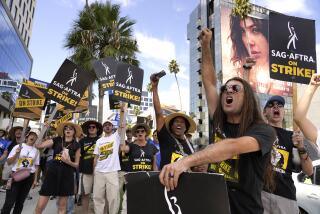Loss of jobless benefits could be serious blow to U.S. economy
Reporting from Washington — With 2 million jobless workers set to lose unemployment benefits this month, the kind of extension that Congress routinely approved in the past has fallen victim to partisan deadlock — and the consequences could be serious for the U.S. economy.
The benefit payments have helped millions of families make ends meet. But they have also pumped billions of dollars into the financial bloodstream of the nation’s economy as it has struggled to regain its footing after the worst recession in more than half a century.
Extending the payments, which average $310 a week, is seen by many experts as a way to prop up consumer spending, which accounts for 70% of the nation’s economic activity.
“In terms of bang for buck that you get, this is one of the most effective things the government can do,” said Justin Wolfers, a professor at the University of Pennsylvania’s Wharton School.
California and other states hit hard by the recession are likely to feel the sharpest effect. Without an extension, 454,000 jobless Californians will see an end to their benefit checks this month, according to Labor Department figures. Nearly 200,000 people in Florida and about 124,000 each in Illinois and Pennsylvania stand to lose payments by year-end.
Since unemployment began to surge in the latest recession, Congress has passed four benefit extensions, adding a total of 73 weeks to the program’s regular 26-week maximum benefit period.
Some Republican lawmakers want the extensions to end because they believe that prolonged aid encourages the jobless to stay home and put off serious job hunting. Others such as Rep. John Shadegg (R-Ariz.) have said the unemployed tend to hold off on spending their benefits.
Advocates for the unemployed counter that there aren’t enough jobs to go around, requiring the government to step in.
“Without unemployment benefits, I’m not really sure I can hold on to my house,” said Dorothy Allen, a single parent outside Scranton, Pa. “I’m praying it will be extended. If not, I’ve already obtained an application for welfare.”
The political stalemate in Washington comes at a crucial juncture in the recovery. Although the economy has picked up some momentum lately — with manufacturing, retail sales and job growth looking better — many consumers and business executives remain on edge as the housing market continues to slump and new dangers arise from Europe’s debt troubles.
The outbreak of new geopolitical tensions in the Korean peninsula also has contributed to concern about the U.S. economy’s future and cast a pall over Wall Street.
“It’s happening at a time when the recovery is very fragile and moreover in the Christmas shopping season,” said Mark Zandi, chief economist at Moody’s Analytics.
Zandi and many other economists see extending jobless benefits as a practical necessity, but the measure failed to win the support needed in the House before Thanksgiving, and Senate Democrats had no luck Tuesday in their bid to renew the program in a fast-track floor vote.
Many Republicans and a small number of Democrats say they’re not against continuing benefits for the unemployed, but they want the government’s spending to be reduced by the same amount.
That throws jobless benefits into a bitterly partisan fight over preserving the Bush-era tax cuts and how to deal with the overall budget deficit, making it more likely than ever that the emergency federal benefits for the unemployed will be cut off permanently.
If that happens — and some leaders still hope to include a compromise on jobless benefits in a larger deal over tax cuts — it would come well before such benefits were curtailed after past periods of high unemployment.
It was 28 months after the deep recession in the early 1980s that emergency benefits ended, and unemployment then was 7.2%. It is now only 17 months since the official end of the last recession, and the jobless rate is at 9.6%.
Wolfers of the Wharton School was among 33 economists, including five Nobel laureates, who signed a statement urging President Obama and congressional leaders to extend the jobless benefits.
Extending the program, the statement says, “will not contribute significantly to long-term deficits because its costs will diminish automatically as the economy recovers and unemployment returns to more normal levels.”
More to Read
Inside the business of entertainment
The Wide Shot brings you news, analysis and insights on everything from streaming wars to production — and what it all means for the future.
You may occasionally receive promotional content from the Los Angeles Times.











